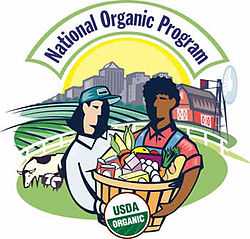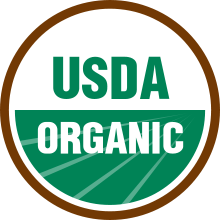National Organic Program


In the United States, the National Organic Program (NOP) is the federal regulatory framework governing organic food. It is also the name of the organization in the Department of Agriculture (USDA) responsible for administering and enforcing the regulatory framework. The Organic Foods Production Act of 1990 required that the USDA develop national standards for organic products, and the final rule establishing the NOP was first published in the Federal Register in 2000[1] and is codified in the Code of Federal Regulations at 7 C.F.R. 205.
Overview
The NOP covers fresh and processed agricultural food products, including crops and livestock. It does cover non-food products that may be sold as organic, including natural fibers (e.g.: organic cotton). Health and beauty products (e.g.: organic shampoo) can also be labeled organic if compliant with NOP. The USDA NOP does have the authority to enforce organic standards in the realm of health and beauty products, and were encouraged to do so in a 2009 recommendation from the USDA National Organic Standards Board. While the actual law does apply to these products, enforcement remains limited in this market.[2]
The National Organic Program grew from fewer than twelve total employees in 2008 to approximately thirty in 2010. As of April 2011, it operates in three divisions: Standards, Accreditation and International Activities (AIA), and Compliance and Enforcement.[3]
In August 2008, the NOP announced that 15 of 30 federally accredited organic certifiers had been placed on probation for various violations of USDA organic standards.[4]
Regulation
The Organic Foods Production Act of 1990 "requires the Secretary of Agriculture to establish a National List of Allowed and Prohibited Substances which identifies synthetic substances that may be used, and the nonsynthetic substances that cannot be used, in organic production and handling operations."[5] and the Secretary of Agriculture promulgated regulations establishing the National Organic Program (NOP) in 2000. It restricts the use of the term "organic" to certified organic producers (excepting growers selling under $5,000 a year, who must still comply and submit to a records audit if requested, but do not have to formally apply). Certification is handled by state, non-profit and private agencies that have been approved by the United States Department of Agriculture (USDA).
NOP regulations cover in detail all aspects of food production, processing, delivery and retail sale. Under the NOP, farmers and food processors who wish to use the word "organic" in reference to their businesses and products, must be certified organic. Producers with annual sales not exceeding $5,000 US are exempted[6] and do not require certification (however, they must still follow NOP standards, including keeping records and submitting to a production audit if requested, and cannot use the term certified organic). A USDA Organic seal identifies products with at least 95% organic ingredients.[7]
Certification agencies
There are currently 56 U.S. domestic certification agencies accredited by the USDA, including Organic Crop Improvement Association, California Certified Organic Farmers, Oregon Tilth, Quality Assurance International (QAI), and Ecocert ICO LLC. There are also 41 accredited foreign agencies that offer organic certification services.[8]
See also
References
- ↑ 65 FR 80548 (December 21, 2000)
- ↑ "Organic Food". Organicconsumers.org. Retrieved 2012-09-09.
- ↑ "Agricultural Marketing Service - National Organic Program". Ams.usda.gov. 2008-10-31. Retrieved 2012-09-09.
- ↑ Reed, Matthew (June 16, 2010). Rebels for the Soil: The Rise of the Global Organic Food and Farming Movement. Taylor and Francis. p. 99. ISBN 978-1844075973. Retrieved February 18, 2015.
- ↑ Text copied from "National List of Allowed and Prohibited Substances". Agricultural Marketing Service. Retrieved 15 June 2011.
- ↑ "Organic foods: Are they safer? More nutritious?". Mayoclinic.com. Retrieved 2012-09-09.
- ↑ "Organic Labeling and Marketing Information". Retrieved 2012-09-09.
- ↑ "List of Accredited Certifying Agents". Ams.usda.gov. 2008-10-31. Retrieved 2012-09-09.
External links
- The National Organic Program Official USDA site
- Organic Standards Database to compare the EU regulation on organic farming, the National Organic Program (NOP) of the US and the guidelines for the production, processing, labeling and marketing of organically produced food of the Codex Alimentarius
- USDA Organic profile on database of Market Governance Mechanisms
| ||||||||||||||